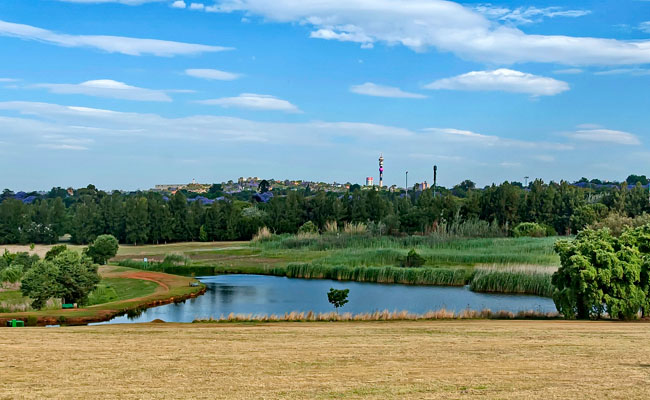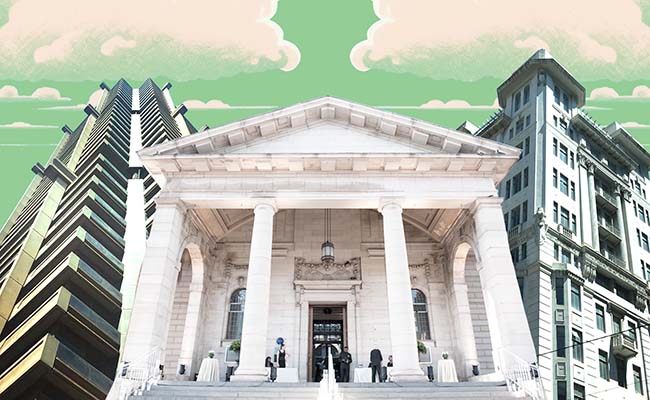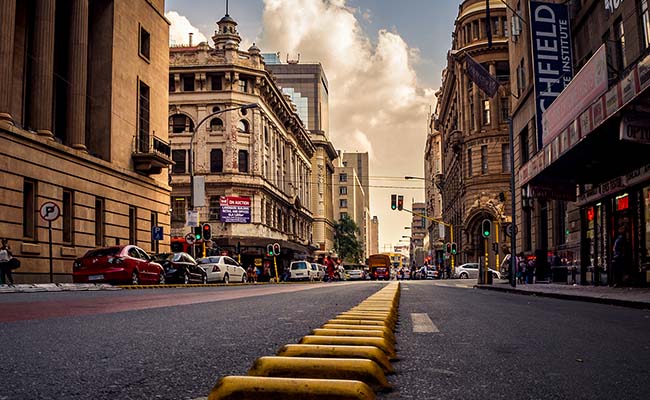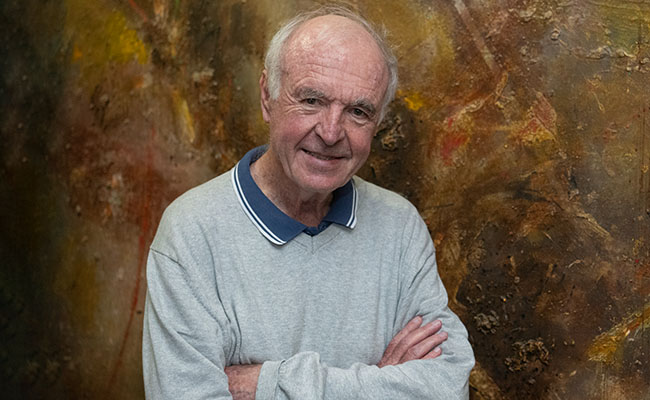Joburg, the country’s fraying economic, hub which has reeled from crisis to crisis, has hit on an alarming new plan to raise money: selling off parts of the showpiece greenbelt just north of the city.
Last week an innocuous-sounding item was tabled by the Joburg Property Company (JPC) at the city council, proposing the beginning of a public participation process regarding a long-term lease of “Marks Park”.
Only, it soon emerged that the area referred to as “Marks Park” actually included the entire 173-hectare Braamfontein farm 53-IR – an area that includes parts of the Melville Koppies, the Botanical Gardens, and the Westdene and Emmarentia dams, alongside swathes of greenbelt areas.
For Nicolene Jonker, the councillor for Ward 88, which includes these areas, it was a red light. A public participation process is the “first formal step towards declaring the property surplus to municipal needs, and making it available for disposal”, she says.
Jonker says it became clear that the JPC wasn’t just talking about a “new lease” either, but rather “alienation” of the land – which refers to the “permanent disposal of municipal property, either through sale, donation, or by granting long-term rights that effectively remove the land from public ownership and control”.
This prospect has fired up residents, furious that the city may be trying to sell one of the most well-used green areas in the city. It was donated by a businessman named Louw Geldenhuys in 1939 on the condition it be used for recreational purposes. The suburb Emmarentia is named after Geldenhuys’s wife.
“Nothing beautiful will remain in this country at this rate, these old people really are selling everything for a buck,” one resident, Thembi Dzana, complained on Facebook. “The city cannot sell the land; it is not their land to sell.”
A petition has since circulated, demanding that the JPC withdraw the proposal. The land is a “functioning and irreplaceable part of Joburg’s parks, heritage, and ecological network. It belongs to the people, and it must remain with the people,” it says.
But despite what the public notice says, Sizeka Tshabalala, a general manager at the property company, claims there is no truth in the allegations that these public spaces will be sold or used to develop low-cost housing.
Jonker doesn’t buy it. She says until the JPC produces any subdivision plans, or confirms which areas are excluded, the notice is clear it includes all this land.
Turning green into gold
There is one thing on which the JPC and the angry residents agree: it’s all about the money.
In its notice, the JPC says the land “could yield significant revenue to the city through rates, taxes and municipal service charges once developed”.
It values the land at R50m – cash that city officials, who have accused in recent weeks of “abusive” billing and money-collection practices, evidently cannot wait to get their hands on.
As it is, one third of its infrastructure investment comes from borrowing, and the city’s wage bill has rocketed in recent years, to R19.3bn last year – more than doubling from R8.5bn a decade ago, as it went on a hiring spree.
The JPC’s Tshabalala argues that the need to redo the Marks Park lease stems from the “unreasonable” terms of some of these properties. Marks Park pays the city R49 per year as rent, which she says, “doesn’t make any business sense”.
While that’s chump change for the sports club, it’s not entirely unfair, since the land was donated to the city by Geldenhuys for public use. But now the JPC and the city, eager to capitalise on this space, want to wring more money from it.
Tshabalala also says there are certain portions of Marks Park that are underutilised and could be better used to “address the city’s priorities”.
She then adds that, “as the owners of these properties, the city should be deriving income from these properties”.
This is a strange thing to say if you are not planning on selling the land and pocketing the money, according to Gemey Abrahams, a professional town planner and executive committee member of the Emmarentia Residents Association.
She warns that in other instances, the city has followed the legal processes, but in a way that was vague enough to open up loopholes it could later exploit. Abrahams says this happened with the nearby Parkhurst Bowls Club, which the city is now “alienating for development”. Or, to use the truthful term: selling, to build 204 residential houses, 800 parking bays, and a drive-through taxi rank on Victory Road, which runs parallel to the plot.
“These are our parks, these open spaces,” says Abrahams.
A rogue organisation
The plan to “alienate” large tracts of the greenbelt has hit a nerve precisely because it comes at a time when the city has been ratcheting up rates and utilities bills, while delivering less than ever.
Joburg Water, in particular, has left many residents in the lurch in recent weeks, as taps ran dry. So any plan to keep extracting more from residents, while taking away even the few public spaces the city has, has galvanised anger.
That the proposal comes from the JPC, an entity within the city that has been run with all the governance safeguards of an ANC tender committee, only makes it worse.
The organisation is mandated to manage all 28,193 properties owned by the city, a portfolio worth R9.2bn. But its track record has been dismal: it owns 181 buildings in the city that have been hijacked by warlords and slumlords, yet has done little to address this.
In 2023, a deadly blaze at 80 Albert Street in the city – a building ostensibly managed by the JPC – claimed 77 lives. A report by retired judge Sisi Khampepe into the fire found that Helen Botes, the controversial CEO of the JPC, should bear responsibility for failing to maintain that building for 20 years.
The company should take “appropriate action” against Botes for the “total disregard of managing the Usindiso building despite knowledge of the calamitous state since at least 2019”, the judge found.
And yet, today, Botes is acting COO of the city; there’s been little consequence for her ruinous decisions.
This is perhaps not surprising, given that news reports last year revealed too that the JPC’s board is also manifestly unqualified, with three of its directors being a former tollgate cashier, a receptionist, and a person with a grade 11.
All were said to have been appointed because of their connections to ANC officials in the city, rather than for reasons of competence.
You can see why residents are wary of a proposal to sell a greenbelt from an organisation that has been publicly lambasted for its incompetence when it comes to managing property, and with a history of enriching well-connected cadres.
“Like an alcoholic uncle, the ANC will eventually sell everything to sustain its addiction to greed,” one person said on social media.
The Joburg Crisis Alliance, a loose grouping of organisations such as the Kathrada Foundation, has raised the alarm over what it calls the city’s “vague and contradictory proposals”, calling on its officials to come clean on its intentions.
“The call is clear: no development without full, transparent and meaningful consultation,” it says.
Top image: Emmarentia Park in Joburg. Picture: intsys/Getty Images Plus.
Sign up to Currency’s weekly newsletters to receive your own bulletin of weekday news and weekend treats. Register here.













The call is clear – no development of our public, open spaces AT ALL.
We need to organise resistance to this absolute crime against nature and thus against people waiting to happen. So we need to march – when shall we organise this march on the city?
Hoping for another GRAVY TRAIN
No housing development please only for recreation and sport
I also recomend if they want to ddevelop build a new international sports stadium for rugby and soccer and all other sports facilities for Olympic games all sports under one umbrella
Stop destroying our green land park and coppies. Where will our children play and our pets run free. All you know to do is build low cost housing that is total BD.
Arrest Helen Botes.